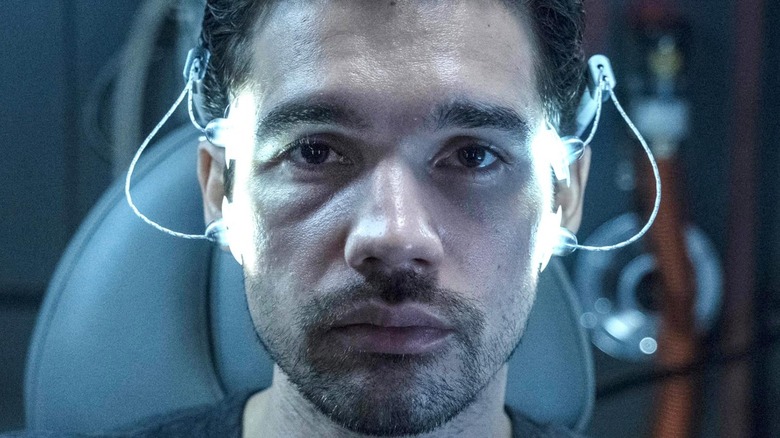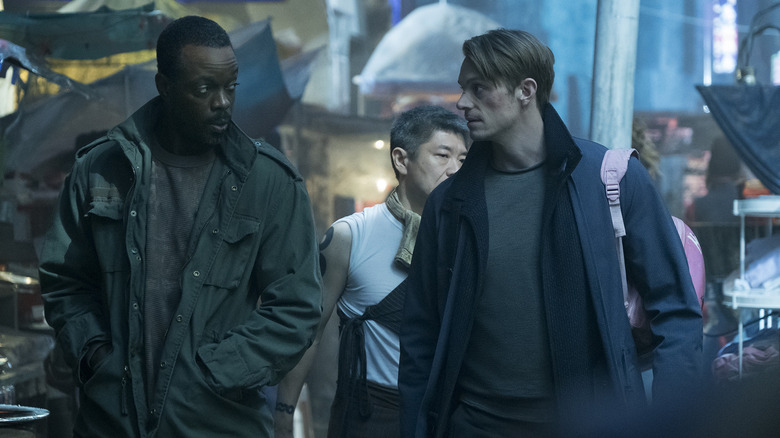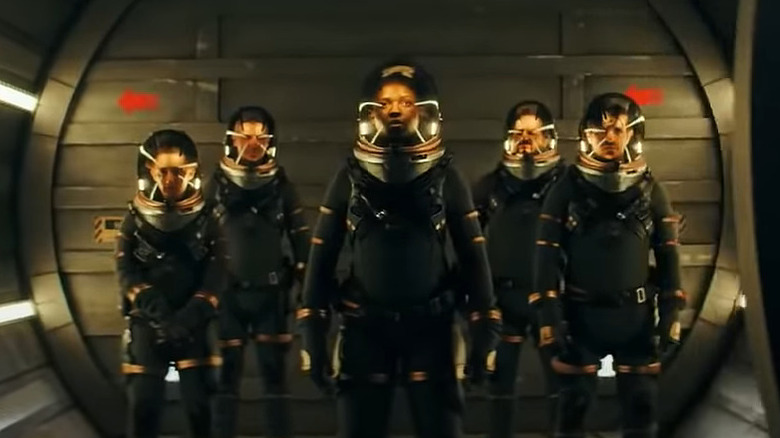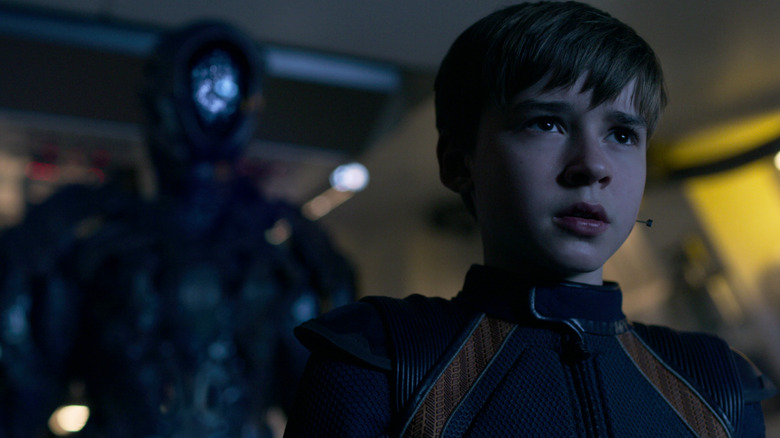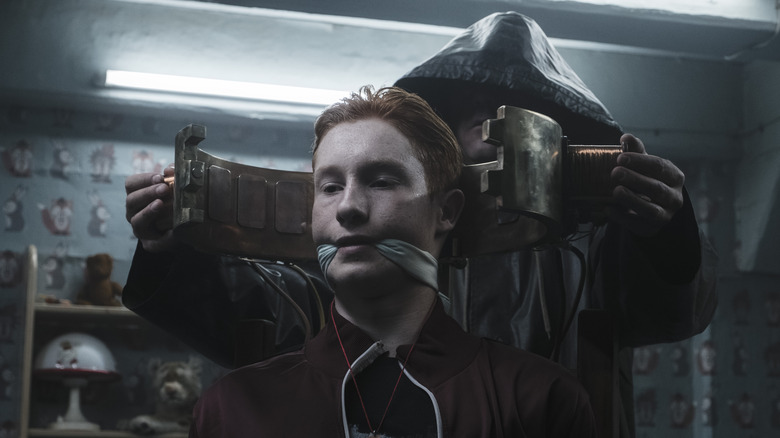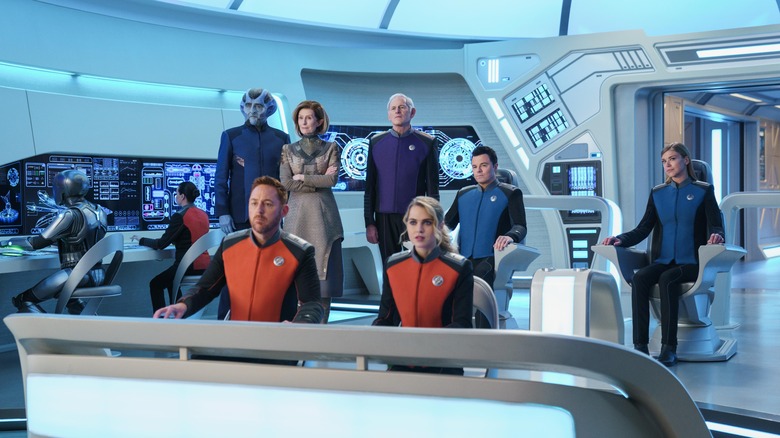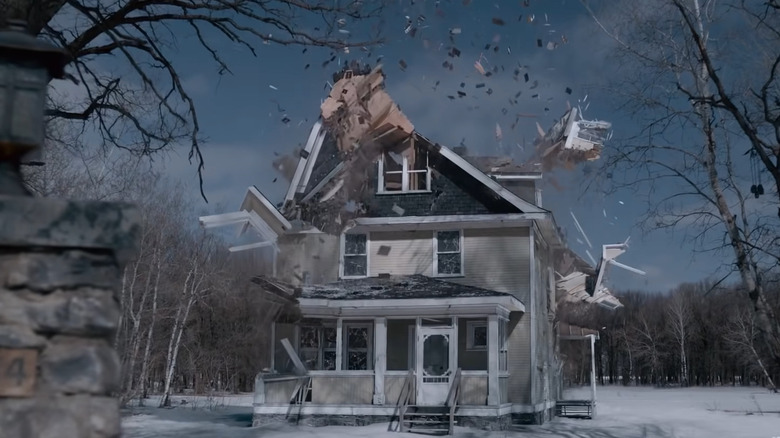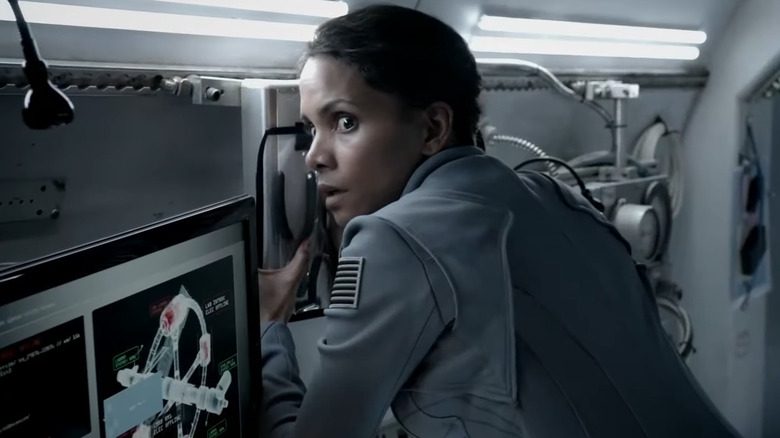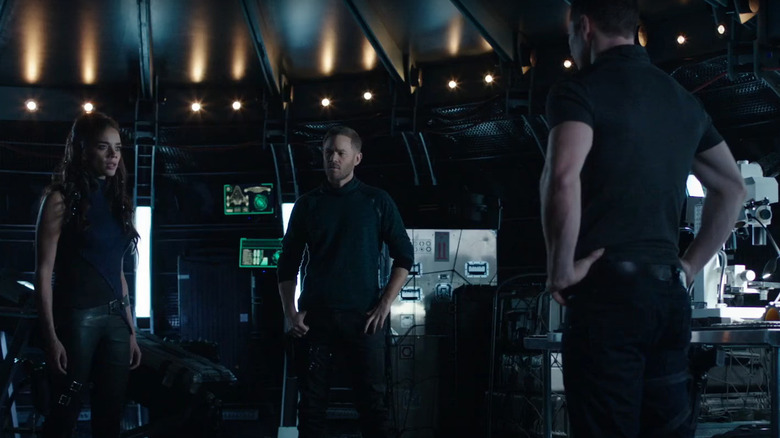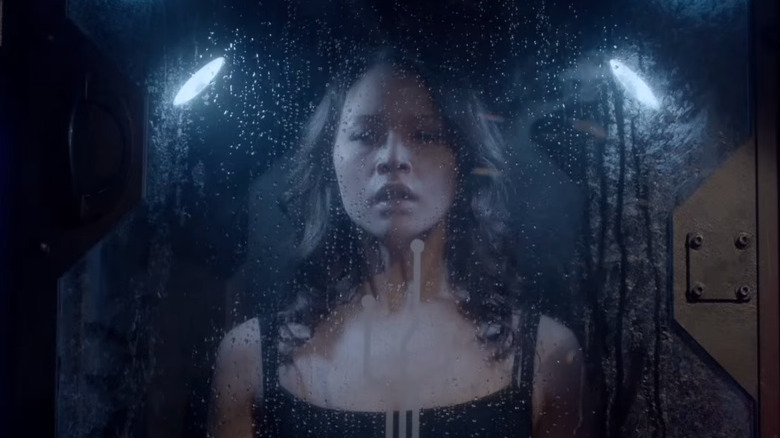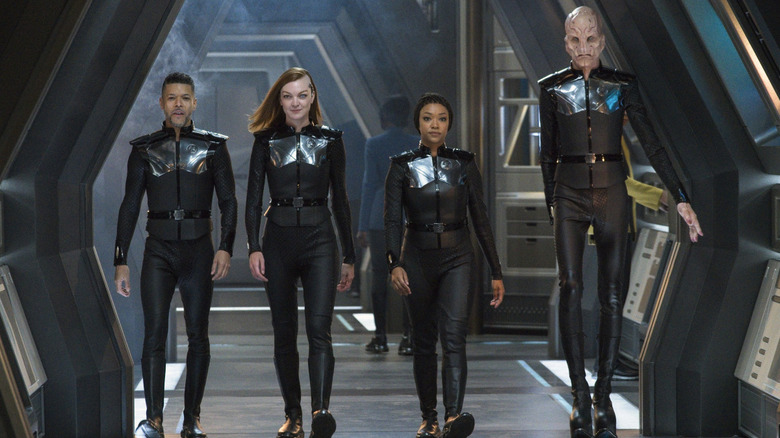Shows Like The Expanse You Definitely Need To See
After six amazing seasons, "The Expanse" remains one of the best science fiction shows we've seen in a long time. Based on the book series by James S.A. Corey (a pseudonym for the writing team of Daniel Abraham and Ty Franck), "The Expanse" depicts a universe where Earth, its former colonies on Mars, and the working-class residents of the Belt teeter on the edge of war. Beginning with a seemingly-simple mystery surrounding a missing woman, "The Expanse" expertly weaves together multiple narratives to create a plot full of political intrigue, cosmic horror, rising economic and social tensions, and terrible fates for everyone caught in the middle.
The TV series only covered the first six of the nine novels written by Corey, and thus left some plotlines dangling. What happened to Cara and her brother? Where did the protomolecule end up? What's the deal with the "dogs" on Laconia? When you have a universe this rich, it is almost impossible to tie up every single loose thread, and "The Expanse" inevitably left us craving more. Sadly, it was confirmed that season six is the official end of the show — for now, at least — but if you've devoured this amazing series and still have an appetite for thrilling and sometimes spooky sci-fi stories, then check out these 10 shows that capture some of the same feelings. They're all well worth a watch.
Altered Carbon
If you loved Josephus Miller on "The Expanse" and need more hard-boiled detectives in your science fiction, then "Altered Carbon" is for you.
"Altered Carbon," which starred Joel Kinnaman ("The Suicide Squad," "RoboCop") in its first season, is a cyberpunk thriller set 300 years in the future, where human memories can be downloaded into new bodies called "sleeves." Takeshi Kovacs, an ex-soldier and former revolutionary turned criminal, is resurrected 250 years after being imprisoned by Laurens Bancroft, one of the richest men in the world, and is recruited to solve Bancroft's own murder ("murder" gets a whole lot more complex when you can make a backup of yourself, as Banecroft conveniently did just before getting killed). Stuck in a corporate-owned body that packs military-grade enhancements, Kovacs must discover who killed Bancroft to gain his freedom — otherwise, it's back to the freezer.
"Altered Carbon" echoes Ridley Scott's "Blade Runner" in its depiction of futuristic California as a dark dystopia. The poor live in rain-soaked slums that are bathed in neon advertisements, while the rich occupy ivory towers, living out endless lifetimes within their designer sleeves. This sci-fi noir is full of twists, turns, and amazing action scenes, which are reminiscent of something out of "John Wick." As with many mysteries, the answers Kovacs uncovers often lead to more questions, and occasionally violent ends.
Nightflyers
While it only aired for one season, "Nightflyers" echoes the psychological thriller and horror aspects of "The Expanse." Produced by "The Expanse" co-creator Ty Franck, the show is based on a novella and a series of short stories by George R. R. Martin.
In "Nightflyers," the people of Earth are dying. In order to save the planet, astrophysicist Karl d'Branin and his team try to make contact with a powerful alien species. Their ship, the Nightflyer, is a state-of-the-art explorer built to traverse the void between star systems.
"Nightflyers" has a plethora of interesting and ominous plot hooks, including a dangerous telepath, a captain who only appears to his crew as a hologram, and the mystery of what exactly led up to the show's violent opening minutes. As the story gets underway, things start to go wrong, and with every step the crew comes to suspect that someone — or something — is trying to stop their mission from succeeding, no matter what the cost.
The show can be heavy handed with its references at times, but if you love high-stakes horror, "Nightflyers" is a fun watch that will have you questioning what is real, and what's only in your head.
Lost in Space
As a remake of the classic 1960s show, Netflix's "Lost in Space" is polished and full of high-intensity action that'll make you wonder just how cursed the Robinson family is, exactly.
Through just a tiny bit of cheating, the Robinsons have managed to join the Resolute, a group of colonists looking for habitable planets in Alpha Centauri in the 24th century. When the Resolute is catastrophically damaged under mysterious circumstances, everyone is forced to evacuate. During their escape, the Robinsons end up crashing on an unknown planet. There, they struggle to survive while dealing with backstabbing stowaways, the damage to their only means of escape, the issues that threaten Maureen and John's marriage, and what to do with the friendly yet ominous alien robot that follows their son Will like a lost dog.
Despite the fact that it focuses more on a family and is less gritty than "The Expanse," "Lost in Space" is just as tense and exhilarating. The Robinsons are faced with increasingly perilous situations at every turn, while the action is punctuated by poignant moments of family togetherness.
Fans of the original series may note that the gender-flipped Dr. Smith, played here by Parker Posey, is subtler than the previous incarnation of the character, but her ability to manipulate those around her makes Smith just as deliciously nefarious as her predecessor. And don't worry, the robot still utters the classic line, "Danger, Will Robinson!"
Dark
Like "The Expanse," the German science-fiction thriller "Dark" trusts its audience to navigate the twisted, interwoven plotlines that form the heart of its narrative. What starts out as a simple crime drama ends up relying heavily on time travel, unraveling a twisty tale that encompasses three generations' worth of conspiracies and reality-breaking (and perhaps brain-breaking) concepts.
The story's catalyst arrives when two children go missing in a small German town. As expected, the rest of the citizens turn out to look for them, but before long deeply-buried secrets are revealed, threatening to tear the community apart. The show really picks up speed once the characters begin to understand that something supernatural is involved, and through time travel shenanigans we see how events that took place all the way back in the 1800s inform the present day.
Between the many characters and multiple timelines, you may want to keep a notepad handy in order to keep everything straight. That said, "Dark" is complex but very well-executed. It's perfect if you want a challenge when you're trying to explain to your friends what you're watching.
The Orville
Do you need a breather after all the suspense, mystery, and horror of "The Expanse" and its ilk? Maybe — just maybe — a few fart jokes will help lighten the mood.
At first glance, Seth McFarlane's "The Orville" is light-hearted take on the space exploration genre. It starts out a little rough, as McFarlane packs the early installments with his signature brand of juvenile humor, but once you get past the first few episodes "The Orville" becomes a loving homage to Star Trek, albeit one with some "biological humor" thrown in to cut the tension.
In the 25th century, alien societies have joined with Earth to form the Planetary Union. The newly named captain of the USS Orville, Union officer Ed Mercer, is finally living out his dream and commanding his very own ship. Unfortunately, his ex-wife has been assigned to serve as his first officer, and the rest of his crew are an ... interesting bunch. Interpersonal conflicts often accompany larger plots about the clashes between alien cultures, planets being sucked into black holes, and attempts to avoid starting wars by accident.
However, the fascinating thing about "The Orville" is how its heart really sneaks up on you. While the characters are quirky and irreverent, they're also shockingly competent, and each character manages to grow and change over the course of the series. Some of the episodes are jaw-dropping in their poignancy; there are times when you will forget that you are watching a comedy as the tears well up in your eyes. We are eagerly awaiting season 3 to see where the Orville will explore next.
Tales from the Loop
Based on the beautiful art of Simon Stålenhag, "Tales from the Loop" tells the story of the town of Mercer, Ohio, where a secretive research facility studies supernatural phenomena caused by a machine called "the Loop." The show doesn't actually explore the Loop itself, but instead engages with the stories of the people affected by it.
Each episode is a self-contained vignette that presents separate ruminations on the nature of life and humanity. Despite the format, "Tales from the Loop" hangs together as a cohesive narrative through the character of Loretta. Her connections to the show's overarching mysteries are the heartbeat of the series, and our window into this unique setting. Loretta is not always at the forefront of events, but she's always a part of the greater whole. She's the one who holds our hand as we enter the world of the Loop ... but it remains to be seen if she will still be there when the series ends.
"The Loop" moves slower than "The Expanse," with each episode taking pains to build out its own narrative, but that extra time allows the viewer room to contemplate the meanings of these moments in a gentle, guided fashion. By combining pastoral music with stunning visuals, "Tales from the Loop" creates a haunting quality that encourages contemplation. It harkens back to shows like the "Twilight Zone," particularly in the ways in which it inspires introspection and self-examination.
Extant
Imagine this: You've been alone on a space station for 13 months. Returning home is going to be a little tough. You need to slide back into your old life, rekindle your relationship with a husband you haven't seen in over a year, and figure out what to do with the new android son your hubby built for you. Sounds like a challenge, right? Well, how's this for one more little wrinkle: You have also discovered that you are mysteriously pregnant.
"Extant" seems to be executive producer Steven Spielberg's attempt to retell "Rosemary's Baby" in space. The main plot focuses on Molly Woods (Halle Berry) as she tries to figure out where the baby came from, and attempts to keep her pregnancy a secret from the private firm that sent her to space in the first place.
Molly's struggle is interwoven with that of her husband, John (Goran Visnjic), who built their android son Ethan in order to fill the void left by the couple's infertility. John tries to get the larger world to accept his work on androids, but Ethan is showing some troubling behavior, hinting at something more sinister to come. Unfortunately for Molly, the corporation that she's trying to hide from decides to invest in John's work as a way to keep tabs on her.
"Extant" never quite lives up to its high concepts, but its mix of relationship drama, shadowy corporations, alien-human hybrids, and suspicious androids make a fun, slow-burn thriller that will keep you coming back for more — or, at the very least, to see what creepy things will come out of Ethan's mouth next.
Killjoys
"Killjoys" is a fast, fun joyride about a team of interplanetary bounty hunters carving out a life for themselves under an intergalactic feudal system. The show takes a more light-hearted approach to sci-fi than "The Expanse," but it does touch on concepts such as oppression, the struggles between classes, and the issues with mega-powerful corporations. Specifically, "Killjoys" is centered on a system called "the Quad," where each planetary body has its own setting. One is a corporate paradise, another is a factory-laden industrial wasteland, the third is a peaceful farming world, and the last is a mysterious moon that the omnipotent corporation known as the Company has ominously failed to colonize.
The team is headed up by resident badass Dutch, played by Hannah John-Kamen ("Ant-Man and the Wasp," "Resident Evil: Welcome to Raccoon City"). Her partner John Jaqobis ("Locke and Key," "Warehouse 13," and "Smallville" star Aaron Ashmore) has some deeply ingrained self-esteem issues, but is a wiz at technology. His brother, D'avin, played by Luke Macfarlane ("Brothers & Sisters"), is an ex-soldier with a kill warrant out on his life.
Fierce, funny, and sexy, this rough-and-tumble group is a pleasure to watch. The show also comes to a satisfying conclusion after five seasons, so you can binge watch with the comfort of knowing that you'll get a complete story.
Dark Matter
Based on a comic book series created by writers Joseph Mallozzi and Paul Mullie and artist Garry Brown, "Dark Matter" is a story about six people suffering from amnesia. They awaken on a ship with no idea why they're there, but from the onset it's obvious that they're all dangerous individuals with dark pasts. The crew adopts the names one through six, referencing the order in which they woke up, and then get busy trying to figure out who they are and what they were doing before their memories were wiped. Before long, they realize that one of them may be a traitor who's working against the rest.
As the characters uncover details about their previous identities, the crew must decide whether they're going to maintain their new selves, or if they will embrace who they used to be. Along with the amnesia, "Dark Matter" provides a few other mysteries to follow, including an impenetrable door full of secrets and a young woman who has dreams that are not her own. If you're looking for an action-oriented space drama — think "Firefly," with a healthy dash of "Farscape" mixed in — then "Dark Matter" should hit the mark.
Star Trek: Discovery
Many science fiction shows can trace their roots back to "Star Trek." For decades, the franchise has pushed the envelope for representation and understanding on TV, using its sci-fi premise to explore inflection points in our own society. "Star Trek: Discovery" continues this tradition in a dive into the Federation's past. Set 10 years before the original series, "Discovery" establishes that the root of the war between the United Federation of Planets and the Klingon Empire was a mistake made by Commander Michael Burnham, played by Sonequa Martin-Green ("The Walking Dead," "New Girl").
Burnham, a human raised by Vulcans who must navigate the conflict between her emotions and her logical side, becomes the series' focus. We follow her journey on a fungus-powered ship as she participates in mutinies, jumps to the infamous mirror universe, travels through time, engages in ship-to-ship combat, and uses space whales as a kind of Trojan horse.
"Star Trek: Discovery" is darker and more mature than previous takes on "Star Trek," but the show stays true to the franchise's greater ethos; overall, it's a great addition to the series. You can feel the creators experimenting with the genre and pushing the boundaries of what "Star Trek" can be, which is an exciting prospect for such a well-established franchise. If you want a new look at a classic favorite, make sure to check out "Star Trek: Discovery."
